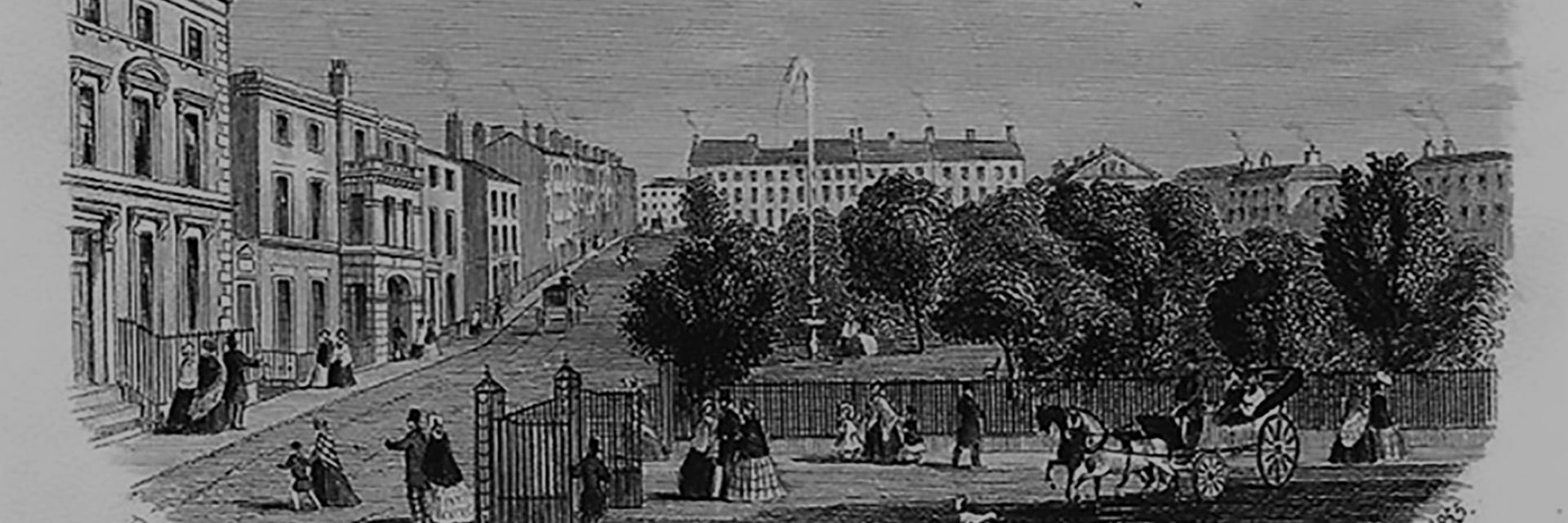
James German
1820 - 1901 | Starkie House, 14 Starkie Street
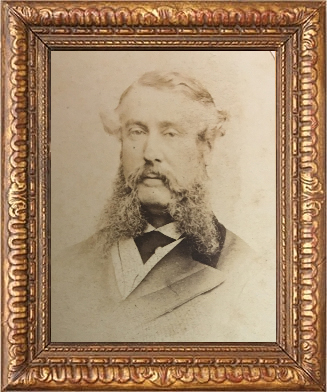
James German was a leading figure in Preston in the mid-1800s. His father, James Fisher German, died when James was only 4 years old, having already squandered a large inheritance. Fortunately James was supported by Thomas German, twice Mayor of Preston (1837-38 and 1845-46). James referred to Thomas as his uncle but he was in fact his cousin once removed.
James built one of the last houses on the Square (Starkie House). He was Mayor of Preston in 1850. Nigel Morgan, in his work ‘Deadly Dwellings’, described him as ‘a tireless public health reformer’ but he adds ‘his political history in Preston was a tragedy in the classical meaning of the word’ (p25)
Early Years
James German was born into a wealthy family in Pemberton in 1820, the first son of James Fisher German and his wife Martha Ann German (née Plumridge).
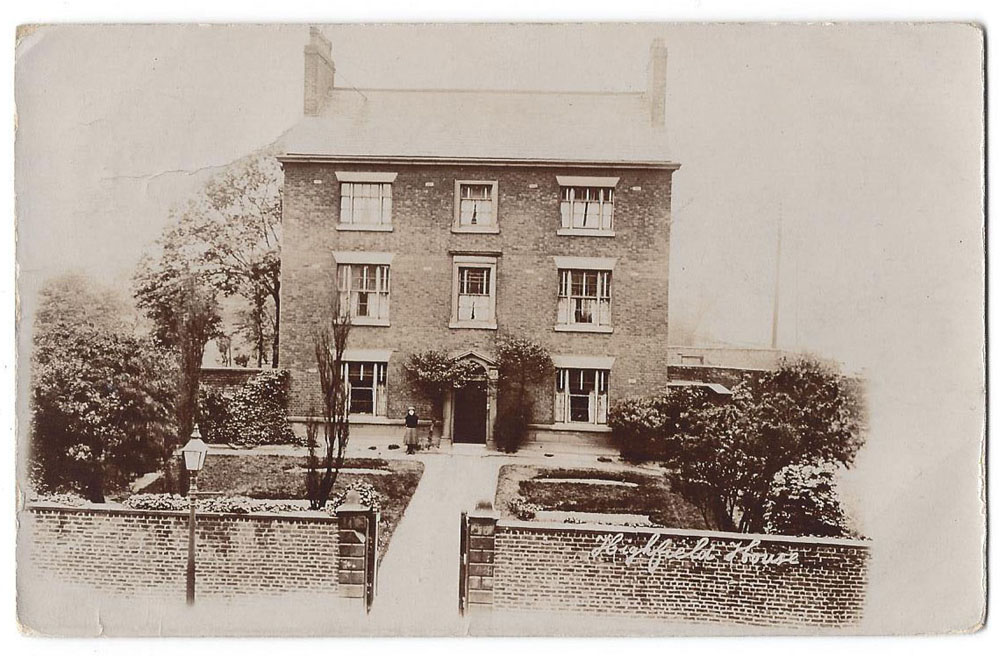
James was born at Highfield House, Wigan and baptised at All Saints Parish Church on January 21st, 1824
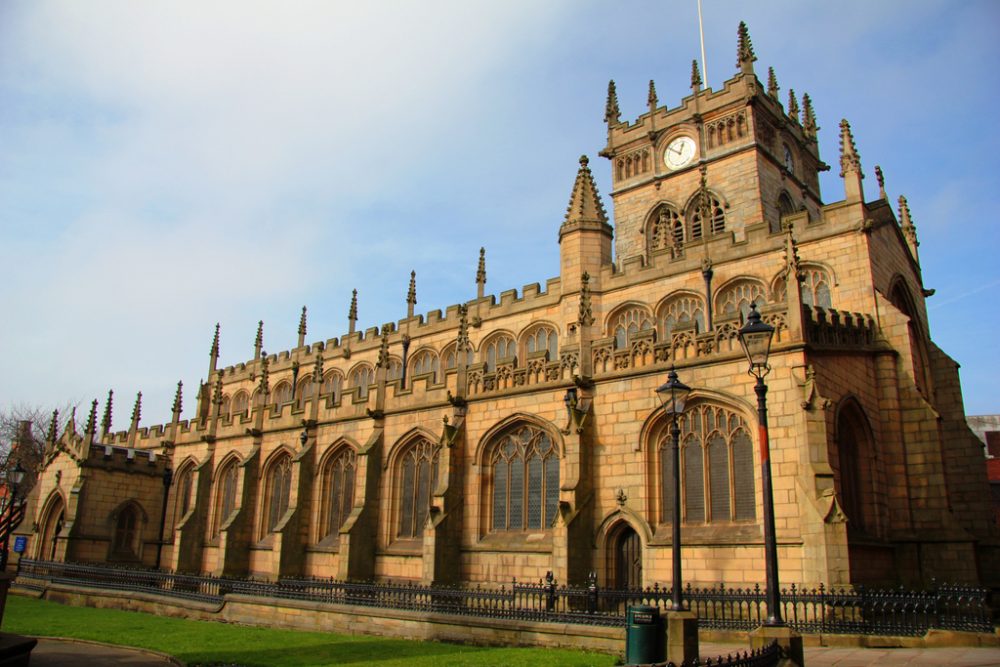
James German’s father died intestate (without a will) at the age of 36. James’ father was due to inherit a share of the Park Hall Estate but he took out loans using his ‘future’ inheritance as security. Heavily in debt, he ultimately received nothing from the estate. He died when James, his son, was only four.
A legal challenge was made on behalf of the infant James but was unsuccessful.
In addition to the care he received from his mother, James was taken under the wing of a relative, Thomas German, with whom he was living when he married in 1841.
In 1839 James’ mother remarried. Martha Ann German married John Williams in Manchester Cathedral. John and Martha were living in Cheltenham in 1841. James, 20, and his future wife Martha Parker, 20, were staying with his mother and stepfather on the day of the census.
James German marries Martha Parker
James married Martha Parker a few months later. Martha came from a wealthy family, the owners of Whittingham House in Goosnargh.
Martha’s mother Ellen Parker died in 1824 aged 24 and her father Henry Parker in 1833 aged 47. Martha had one brother John Burch Parker, born 1822, who inherited the estate. John Burch Parker may not have spent much time at his family home. His Will suggested that he was “of Whittingham and Liverpool” and he may have been engaged in a profession in Liverpool.
Between 1841 and 1844 Charles Fitzherbert Brockholes was living at Whittingham House and occupying 126 acres of land. Following Fitzherbert Brockholes, Bartholomew Brown was listed in the Electoral Register as the occupier with a yearly rent of £50 and upwards.
The marriage of James and Martha took place on August 25, 1841 at Preston, St John (Now the Minster). James was described as a Machine Maker on his marriage certificate.


Martha Inherits
John Burch Parker died unmarried in 1844. Martha became the sole heiress to the 300 acre estate and to Whittingham House.
James German was living with Thomas German at the time of his marriage. He was very close to Thomas. Thomas was the natural (illegitimate) son of Seth German of Preston. He seems to have taken young James under his wing and had a large influence on James. He left him a large bequest in his Will.
Thomas German
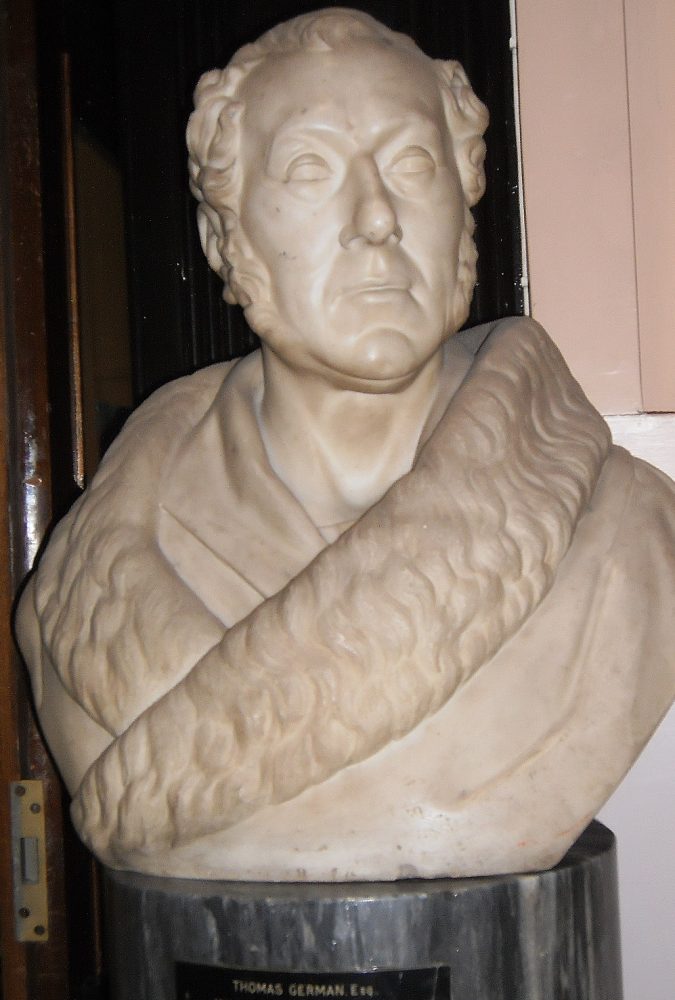
Thomas German was a Flax Spinner and in the 1841 Census was living with his first wife Ellen at his mansion, The Cliff, overlooking the Ribble and what is now Miller Park. Ellen died two years later in 1843 and Thomas, 55, married Helena Fisher, 40, of Walton’s Parade, at St John Church on September 18th, 1844.
Thomas German did not appear to have surviving children from either marriage, which might explain why he appeared to be so fond of his young cousins.
Thomas amassed a large fortune. His personal estate was under thirty five thousand pounds in his Will proved March 22nd, 1848; £3,500,000 in today’s money. He left many charitable bequests.
The following account of the death of Thomas German appeared in the Deaths column in The Blackburn Standard.
DEATHS
On the 19th inst Thomas German, Esq, of the Cliff, alderman of the borough of Preston, aged 64. He has twice served the office of Mayor since the passing of the Municipal Reform Act. He was universally respected; and in him the town loses one of its most liberal and warm-hearted friends.
He was highly regarded in the town as demonstrated by the obituary to him in The Preston Chronicle 25th September 1847.
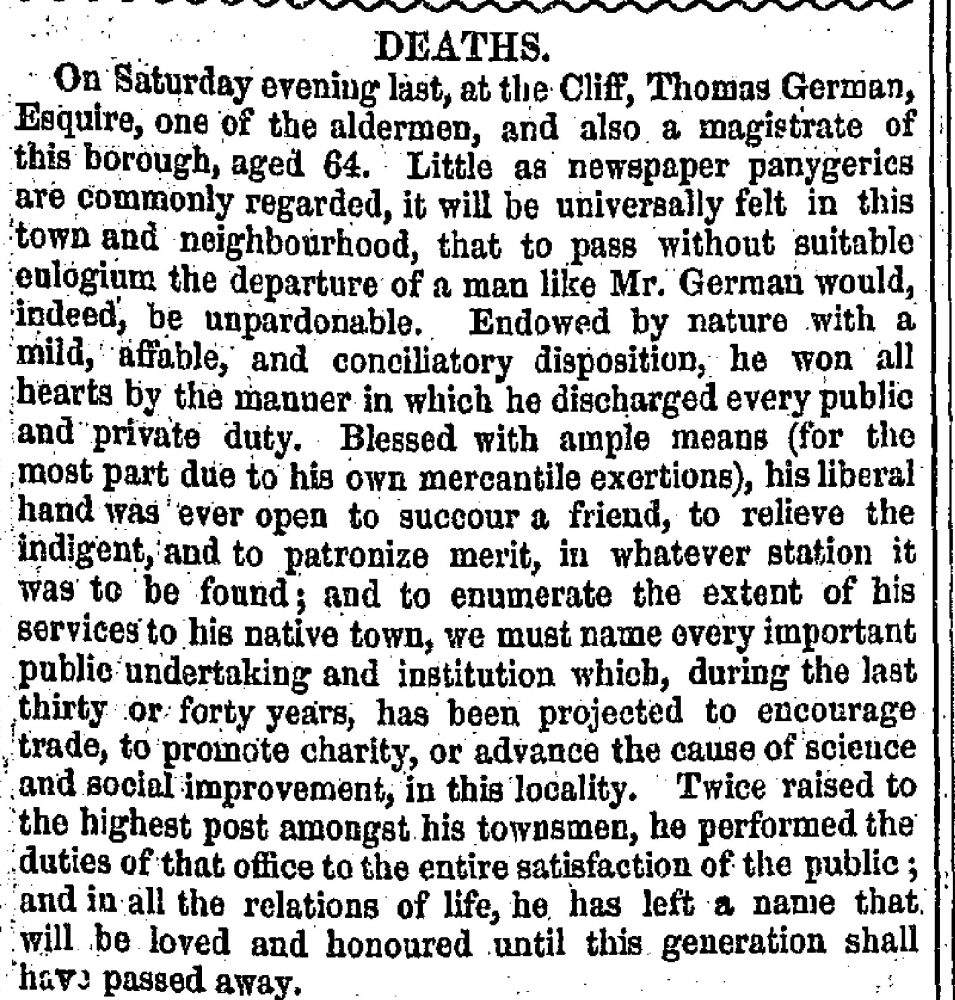
A tablet was later installed in St Peter’s Church (now part of UCLAN) to the memory of Thomas German who bequeathed the money for St Peter’s tower and spire to be erected in 1852.

Political activity, civic impact, misjudgement and departure from Preston
James and Martha lived at 18, Ribblesdale Place in the early years of their marriage and their first child Catharine Fisher German was baptised at Preston, St John on October 22nd, 1844. Note the ‘blind windows’.
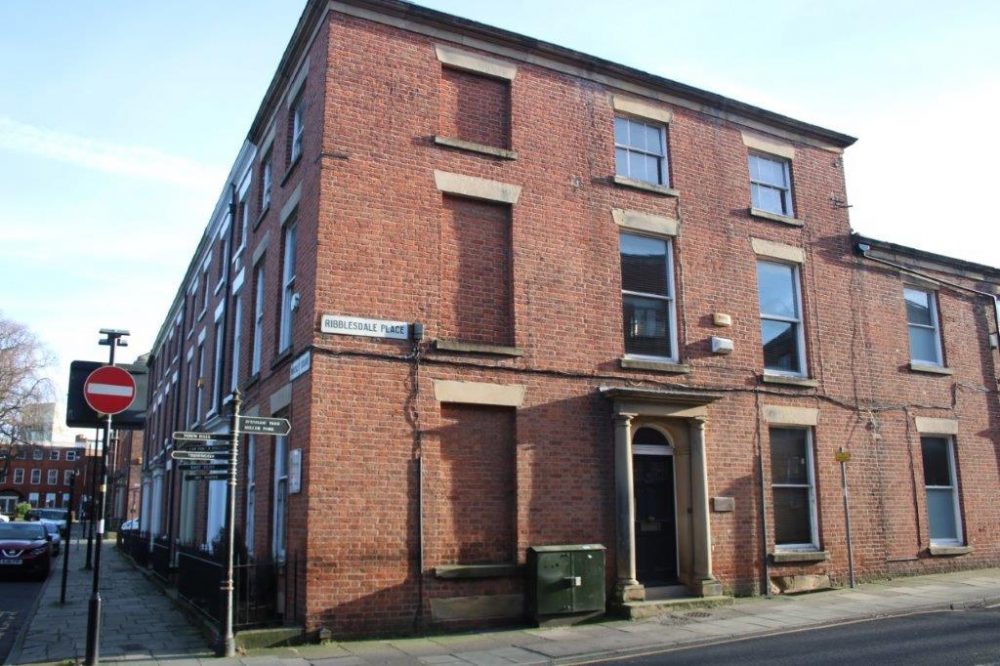
On September 9th, 1844 James applied to the Town Clerk of the Borough of Preston to have his name inserted in the Burgess List of the Borough of Preston. He stated that he had occupied 18 Ribblesdale Place since May 1st, 1844 and that he had been rated in the parish of Preston from May 1st, 1841 to May 1st, 1844 at 1 Stanley Terrace.
James bought a plot of land in Winckley Square to erect a house. The following notice appeared in the Preston Chronicle in 1844:
PUBLIC IMPROVEMENTS AND ALTERATIONS IN THE TOWN AND NEIGHBOURHOOD
‘…it is gratifying to our local pride, to witness the alterations and improvements which have been projected and undertaken in our good town, they are evidence of the increasing prosperity, of the extension of its trade, and the activity of its business. In Winckley Square, James German, Paul Catterall and Thomas Ainsworth, Esqrs, are about to erect handsome mansions, which with the intended buildings for the Literary and Philosophical Institution and News Room will complete three sides of the area, leaving only a small vacancy on the west, short of finishing the square’
Preston Chronicle April 27th, 1844
James was described ‘of Winckley Square’ when his second child was baptised on July 8th, 1848 when it would seem they were living in their new house, 14, Starkie Street (Now Starkie House).
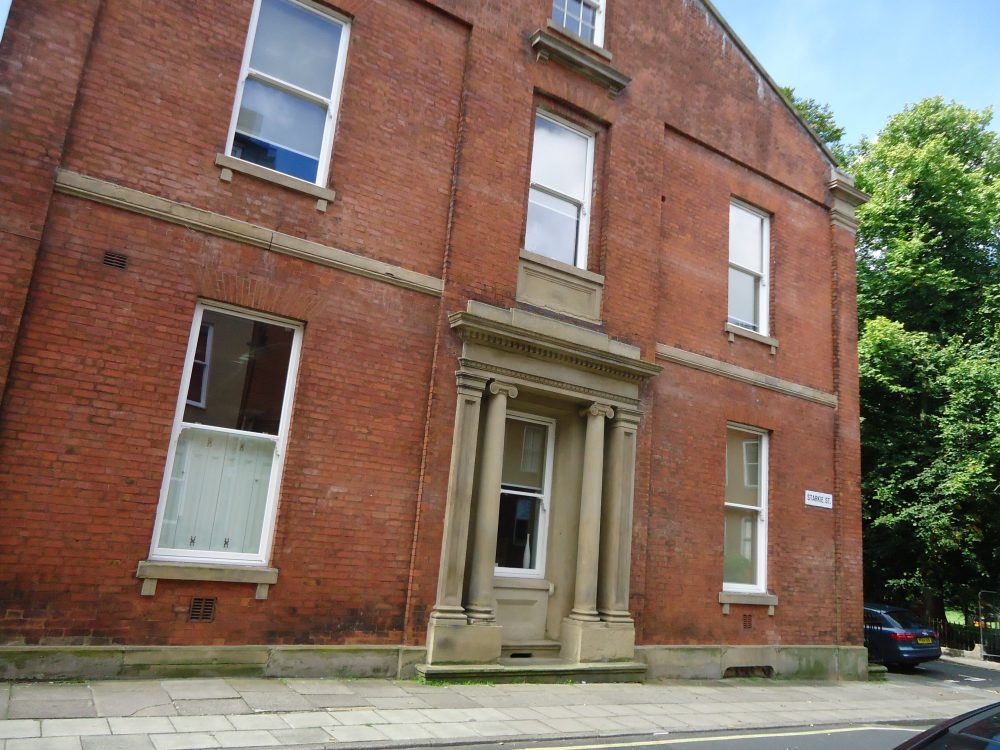
James was very involved in public life in Preston and was elected as one of the Churchwardens at Christ Church in 1842. He was a Commissioner of Police and attended the monthly meetings.
Along with other subscribers in 1844 Thomas German gave £50 and James German £25 to the Building Fund of the Preston Institution for the Diffusion of Knowledge with the addition of a Music Hall.
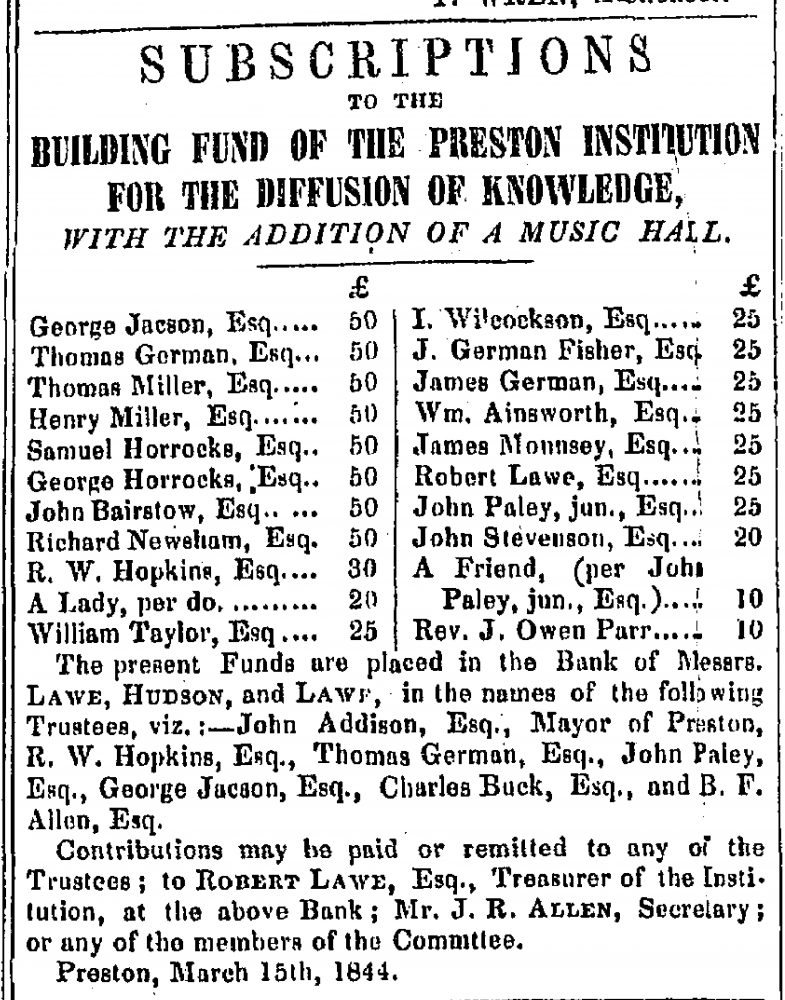
Thomas German, Mayor, laid the first stone in 1845 and it was completed in 1846.
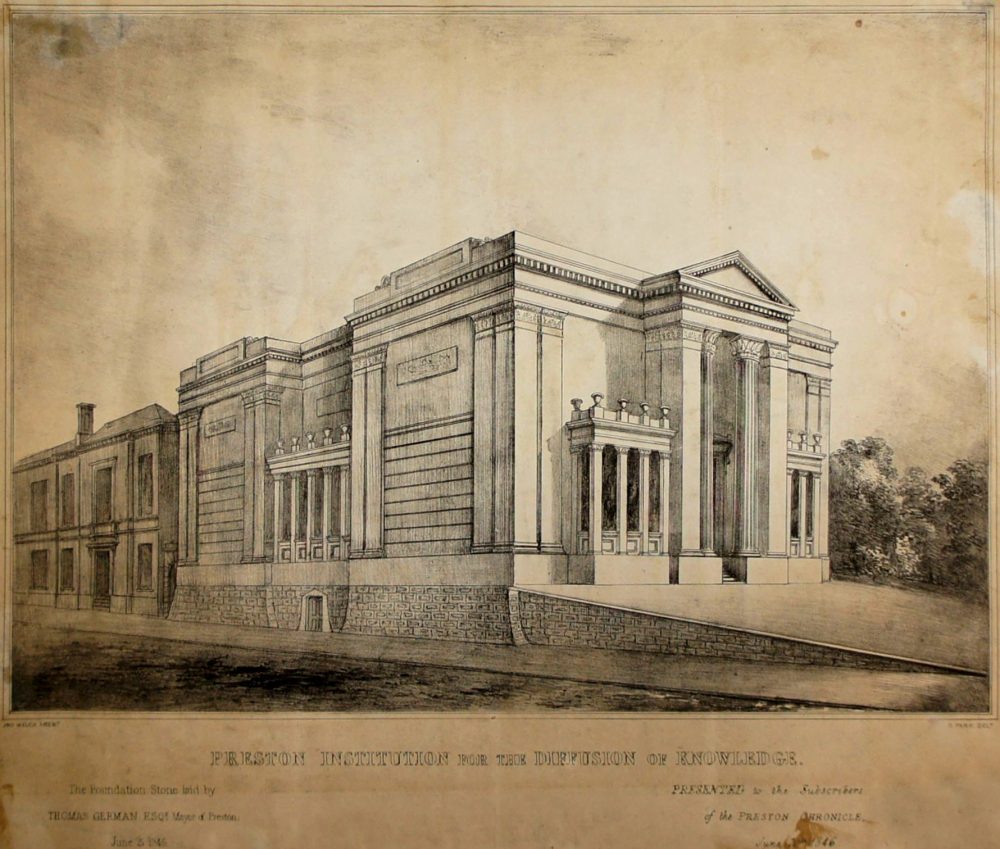
The Preston Chronicle 14th June 1845 reported that due to the ‘delicate state of his health’ James German sold the mill which was being erected for him on Marsh Lane to Mr Richard Yates & Mr John Hamilton of Preston, draper for £1000. The state of his health may have influenced James German in his change of career. In c1845 he was admitted to one of the Inns of Court in London – The Middle Temple. He was called to the Bar in 1849.
The Preston Chronicle January 3rd 1846 reported the staff celebration organised by Machine Makers, Grundy Thos and Co. of Union Foundry, Lord St.
Thomas German and James German were praised at the ‘INTERESTING CELEBRATION’ held for 220 workmen, their employers and friends at the Shelley Arms on Fishergate. It was clear that the employers cared about the health and wellbeing of their workforce by providing ventilated buildings, libraries and baths.
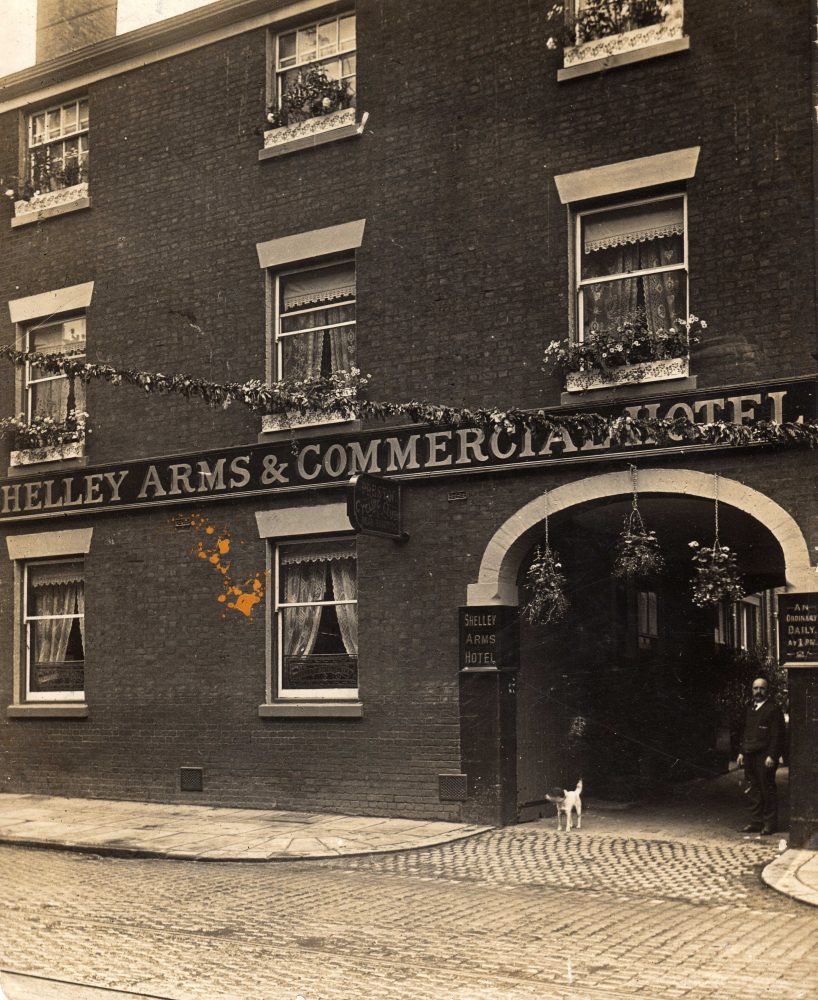
During the 19th Century production techniques moved from a literal reliance on ‘man power’ to an acceptance that machines would undertake the repetitive jobs formerly undertaken by people, both faster and more efficiently.
There is an interesting description of Machinery Making in ‘A History of Preston’ by Anthony Hewitson, pub. 1883.
‘Machine making once formed an important branch of industry at Preston. Forty years ago (1843) there were some excellent machine-making shops here; and Preston was much renowned for its operations in this department of trade. But its old prestige has departed. Want of enterprise, unwillingness to keep up with the times, adhering to old methods and continuing to work with old, superseded mechanical appliances, have been assigned as the causes of this unsatisfactory change. There are still some good machine shops in the town; but Preston has by no means the fame which it once had for machine making’.
Thomas Parker German, son and heir born to James and Martha was baptised at Preston, St John on July 8th, 1848 and named after Thomas German and his mother’s family – The Parkers of Whittingham. Thomas German had died the previous year.
Philanthropy
Great wealth was generated by many large mill owners. Some sought to demonstrate their wealth, and with it their social standing, through the lavishness of their lifestyle and the size and grandeur of their properties and possessions. This drew criticism from some quarters. Others chose a different pattern of spending; supporting good causes. Brian Lewis in ‘’The Middlemost and the Mill Towns’ describes this: ‘Conspicuous contribution rivalled conspicuous consumption as a means of establishing status.’ Dickens associated philanthropy in Education with schools which taught the prevailing social and economic philosophy of the benefactor. James German however, endowed the school and entrusted its curriculum to the Established Church. The comment from the Preston Chronicle indicates that if it was status he sought from his act, then he was successful.
James had a school built in Preston which he partially endowed in tribute to Thomas. The following inscription appears in History of The Borough of Preston And its Environs in The County of Lancaster: Charles Hardwick MDCCCLVII German’s School P491
GERMAN’S Elizabeth-street: – This establishment was built and partially endowed by James German, esq in 1848. Its superintendence is intrusted to the minister of All Saints’ Church. The northern gable bears the following inscription: – “These schools are erected by James German, as an affectionate tribute to the Memory of the late Thomas German, Esq, of this Town, and in grateful Remembrance of his liberal and Christian example”.
The following entry appeared in The Preston Chronicle, Saturday, September 30, 1848 relating to James German and the New Schools:-
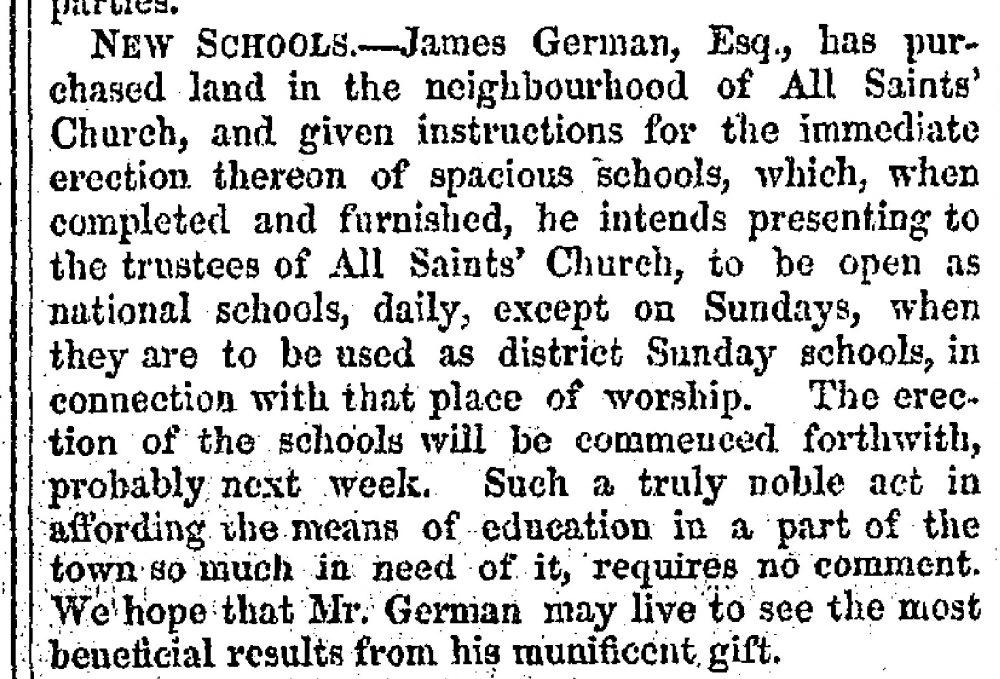
On December 8th, 1849 at the Annual Meeting of the Members of the Literary & Philosophical Institution it was recommended that James German, be appointed vice-patron of the Institution, in the place of Thomas Birchall, who retired in rotation.
Move to Whittingham House
Whittingham House was built towards the close of the 16th Century by an earlier Henry Parker. In 1844 the ownership of Whittingham House passed to James, because of his marriage to Martha.
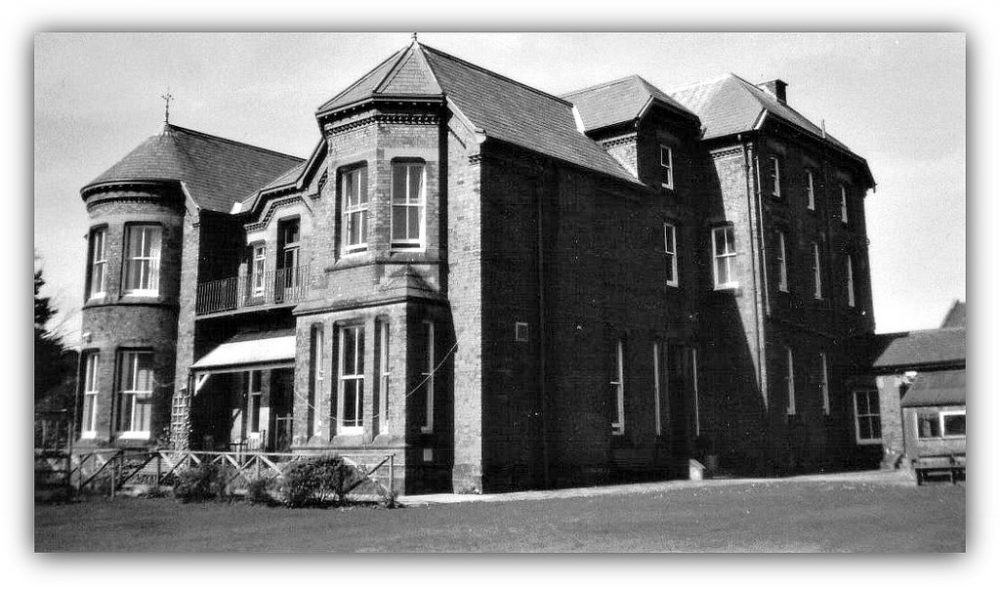
Married Women’s Property Act 1893
Until the late 19th Century, when a woman married she had virtually no rights. She was regarded as an addition to the property owned by her husband. She was not equal to him in the eyes of the Law and had the same legal status as an insane person or a criminal.
All the woman’s wealth and property were controlled by her husband. She could not dispose of any belongings without his consent.
Divorce was virtually unheard of and then restricted to the very wealthy as it required an Act of Parliament.
The Married Women’s Property Act 1893 was an Act of Parliament of the United Kingdom that significantly altered English law regarding the property rights granted to married women. It completed the Married Women’s Property Act 1882 by granting married women the same property rights equal to unmarried women.
The German family continued to live in Winckley Square and didn’t move to Whittingham House until 1851 when James was described in the Census as a Barrister Practising & Alderman, 30. He was living with his wife Martha, 31 and three servants. Catharine was at a boarding school in Cheltenham where James’ mother lived.
Henry Parker German, second son of James & Martha German, was born in 1852 and baptised at Goosnargh Church on May 26th, 1852. In adulthood he served in H.M. Royal Navy.
James had not sold 14, Starkie Street when he moved to Whittingham House. He sold a 7ft 6 inches square plot of land at the bottom of his garden on which the Robert Peel Statue was erected. It was sold to the Corporation for £21 on 31st May 1852. The statue was sculpted by Thomas Duckett
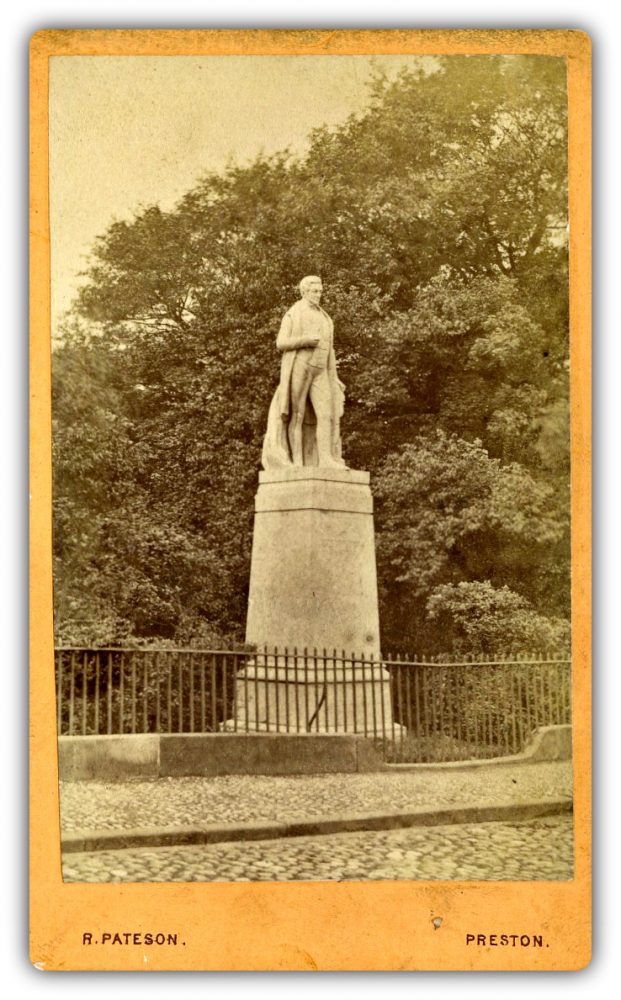
Liberal Politician
James became a significant figure in local politics. He was a councillor from the age of 25, an alderman at 28 and Mayor at 29 in 1850. He was an active campaigner for public health reform. Preston was among the worst towns in terms of sanitation and child mortality. This did not improve – by the end of the 19th century it would be unchallenged in having the worst infant mortality rate in the country. Nigel Morgan (Deadly Dwellings p64) reports that in the final ten years of the decade Preston had the highest under 12 month mortality rate in nine of the 10 years.
James was passionate in his quest to improve sanitation. He drove through the building of the first public baths and wash houses in the town in 1848.
His self-confidence, perhaps bordering on arrogance, and support from his peers is demonstrated in his handling of the issues of the ‘Winckley Square Gates Again!’ in 1850.
However, it seems he overreached himself. There were two seats available for MPs in the town. Political parties would typically put forward two candidates. George Strickland and Charles Grenfell were the sitting MPs and both were Whigs. Only one Conservative, Robert Townley Parker, had stood against them in 1847. In 1852 James German stood as a Radical but in effect as a third Whig. He split the Whig vote. Realising he was not going to win he conceded during the ballot. Nonetheless, by splitting the Whig vote he allowed the Conservative candidate to top the poll. Strickland was also returned but the Whigs had lost a seat.
Anthony Hewitson in his History of Preston, 1883 gives the following account:-
‘In July, 1852, when the next election – one of the general kind – took place, a breach was made in the Liberal citadel. Strickland and Grenfell, as its previous representative, issued addresses for re-election. Mr James German, a well know Preston gentleman, and a native of the town, also appeared in the political arena as a claimant for Liberal support. And Mr Townley Parker, undaunted by previous defeats, once more put in an appearance as a Conservative candidate. Early on the day of election Mr German retired. At the close of the poll this was the official declaration: For Parker, 1,335; Strickland, 1.253; Grenfell, 1,127; German 692.’
Lancashire Archives has a number of Political Handbills which were posted in public places relating to the elections of 1852 and 1872 when James German stood as a Liberal Candidate. The Handbill: – THE VERDICT or NURSERY RHYMES FOR LITTLE REFORMERS relating to the 1852 Election Preston contained a very scathing rhyme about James but praised his uncle Thomas. The 9th verse:
‘Who, conscious of his own poor claim,
Draws largely, on “my Uncle’s fame”,
And seeks the endorsement of his name
To act his gen’rous heart would shame?
JAMES GERMAN’.
Lancashire Archives DP 310
To read the very amusing handbills in full:-
THE VERDICT or NURSERY RHYMES FOR LITTLE REFORMERS – Lancashire Archives DP 310
JIMMY GERMAN’S BAND – Lancashire Archives DP 315
PRESTON Election O Vain Mr. G_ _ _ _n! – Lancashire Archives DP 309
James German was a Captain (later Major) in the 3rd Royal Lancashire Militia. This regiment was established in 1797 and had its headquarters in Preston. There were seven militias in the County. James’ regiment was sent to Gibraltar.
Hewitson gave the following account:-
‘In 1854, when the Crimean war broke out, the militia regiments including the Third Royal Lancashire were called up. The Third was sent to Gibraltar on 29th of June, 1855, and returned in 1856, since which time the staff has been quartered at Preston. At Gibraltar the regiment was about 1,000 strong, and was under the command of Colonel Wilson Patten (now Baron Winmarleigh). It did duty there in the place of regular soldiers, dispatched to the seat of war in the Crimea.
About a couple of years after the return of the regiment from Gibraltar, Captain (now Major German), who was connected with the regiment, built and let to the officers the Mess Rooms in Starkie-street.’
History (From AD To 1883) of Preston in the County of Lancaster: A Hewitson 1883 p310-11
Death of Martha
Tragedy was to strike the German family when Martha died at the age of 37 on June 20th 1856. She was buried at Goosnargh, leaving James and two young children. The following year James married Marion Elizabeth Cooke, daughter of Charles Cooke at Areley Kings, Worcestershire, on July 23rd, 1857.
The following account of the marriage appeared in Aris’s Birmingham Gazette, Monday, July 27, 1857.
MARRIED
On Thursday last, at Areley Kings, Worcestershire, by the Rev H. J. Hastings, Rector, and Chaplain to the Right Rev. the Lord Bishop of Llandaff, assisted by the Rev. Henry Hill, M.A. Rector of Felton, Herefordshire, James German, Esq, Captain Third Royal Lancashire Militia, and Justice of the Peace for the county of Lancaster, to Marion Elizabeth, eldest daughter of the late Charles Cooke, Esq, of Ledbury, Herefordshire.
James and Marion moved first to London in 1860 then to Kent by 1871. They had 10 children. He retained his role in the Lancashire Militia.
In 1872 James German once more ventured into the political arena in Preston. Still appreciated by many in Preston, they invited him to return and stand for election. By now the Whigs had become Liberals (from 1859). The following account appears in Hewitson’s History of Preston, 1883 pp145-46
‘Through the death of Sir T.G. Fermor Hesketh, in August, 1872 there was again an election at Preston. The Ballot Act was now in force, but it had not been long in operation; and there had been only one election in the country, before this, conducted under that Act.
For the vacancy, created by the death named there were two candidates – John Holker, Esq, Q.C. leader on the Northern Circuit who was selected by the Conservatives, and Major German, who this time appeared in response to an invitation, unanimously sent from the Liberal leaders in the borough.
Previously viewed as a kind of hybrid politician, Major German now became the accepted champion of the Liberal cause here. But he had much to contend with. The Conservatives were compact as a phalanx. The Liberals, though centrally united were laterally hampered by numerous self-opinionated crotchety sections, all having a fairly strong regard for the general cause of Liberalism, but each hugging some particular “notion”, and desiring its approval by Parliament. There were the permissive Bill people, the Contagious Diseases Act denouncers, the Anti-Vaccinationists, the Women’s Right supporters, the Trade Unionists, the Liberationists, the Irish party, &c, as environments, all needing certain approval or recognition ere they could be drawn closely and reliably to the Liberal candidate. Surrounded by these heterogeneous elements, Major German did his best to concrete them for Liberal purposes on the day of the election; and apparently he exercised a strong, hopeful influence upon them. The campaign was a vigorous one; but the Conservatives could not be driven from their stronghold. The election took place on the 13th of September, and the votes recorded were: – For Holker, 4,542; for German, 3,824. Not long after this – on the 16th of October – the Liberals of Preston, by way of marking their appreciation of the gallant stand made on behalf of their cause, by Major German, presented him, in the Corn Exchange, with a beautiful group of silver plate about 300 ounces in weight; and at the same time they presented to Mrs German – in recognition of the courteous and sympathetic part she took during the campaign – a handsome gold bracelet, bearing a diamond monogram. …..
Note 1.The voting was at this time on the open system, and every hour private messages got the state of the poll for the newspaper offices, &c where it was prominently posted up. The Ballot put an end to this.’
In the 1881 Census the German family were living in Sevenoaks with 10 children including Catherine (Martha’s daughter) and her husband John Slagg (later MP for Manchester)
James maintained his connections with Preston and was a Justice of the Peace in both Kent and Lancashire. When his third daughter Marion married in 1882, her husband was W Cooper son of John Cooper of Preston.
By 1901, at the age of 80, James’ health had declined. A sick nurse was now in the household. Marion 64, the youngest daughter Ethel, 27 and four servants were also listed in the Census.
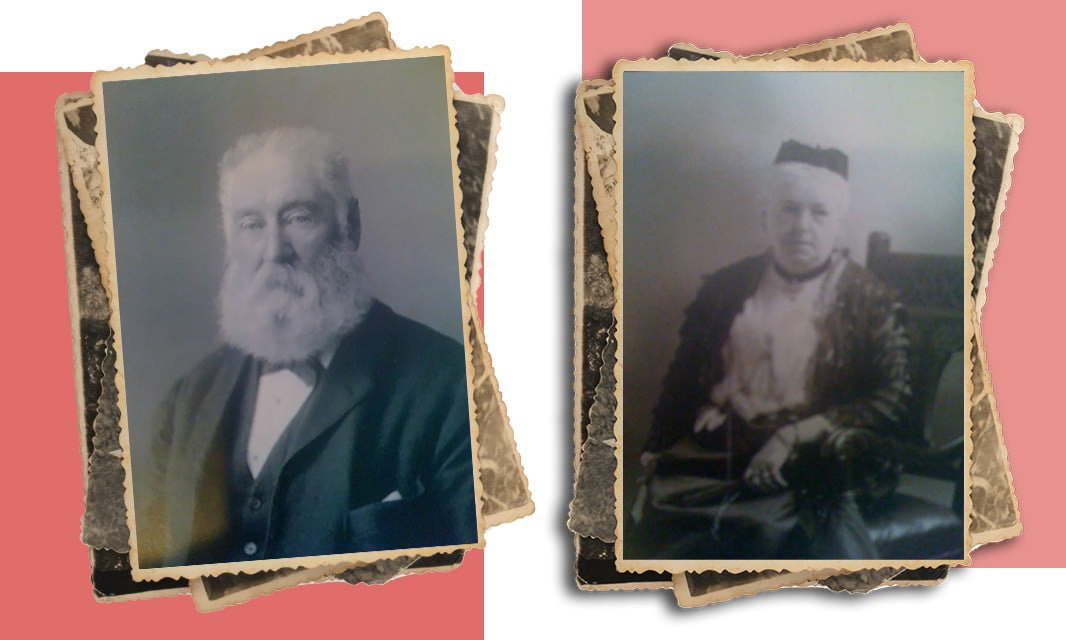
James died just over 6 months later on October 26th, 1901 and was buried at St Nicholas’ Church, Sevenoaks, Kent.
A report of his funeral is in The Manchester Courier & Lancashire General Advertiser dated Saturday, November 2, 1901
Funeral of a Former Mayor of Preston
There were interred in the burial ground of St Nicholas’s Church, Sevenoaks, Kent, this week the remains of Major James German, who in his early life, was closely connected with Preston, being in the textile business there. When he was 29 years of age Mr German was the Mayor of Preston, and he was also for many years one of the Justices of the Peace for the county. In 1849 he was called to the bar, and he spent some years in practice. Twice he stood as a candidate in the Liberal interest for the representation in Parliament of Preston. The Liberals of the town presented Major German with 300 ounces of silver plate. Major German had a commission in the 3rd Royal Lancashire Militia. He was 81 years of age.
Probate of his Will was granted at London on July 30th, 1902 to his youngest son Arthur German. His Effects amounted to £5,039.16s.1d. (£608,404 today)
His widow Marion lived a further 10 years and died on May 24th, 1912 aged 75. Probate of her Will was granted at Canterbury August 21st, 1912. She was then living at Menteith, Canterbury, her Effects amounted to £616.1s. (£71, 000 today)
Useful Sources
This text was prepared using the online sources, Ancestry, FindmyPast and British Library Newspapers.
Trade Directories and Electoral Registers in the Harris Library and Lancashire Archives
Primary Sources in the Lancashire Archives:-
Ref: DP/308-310 3 Handbills relating to the Election contested by Sir George Strickland, Bart, Robt. Townley Parker, Charles Pascoe Grenfell & James German of Preston, November, 1852
Ref: : DP/315 A rhyme relating to the election contested by John Holker & James German at Preston, September, 1872
Secondary Sources in the Lancashire Archives:-
History of The Borough of Preston And Its Environs in The County of Lancaster: Charles Hardwick MDCCCLV1
History (From AD To 1883) of Preston in the County of Lancaster: Anthony Hewitson, Preston, 1883*
History of the Parochial Chapelry of Goosnargh: H. Fishwick
Charnock Richard Lancashire A History: Ray Winstanley & Janet Byers, 2007
By Jane Hamby & Patricia Harrison